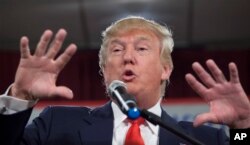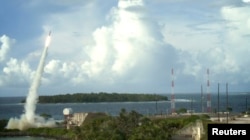On the eve of the U.S. Republican convention, two powerful U.S. senators urged South Korea to take any criticisms made by the presumptive party nominee Donald Trump about America’s commitment to Asia with “a grain of salt.”
John McCain, the Republican chairman of the U.S. Senate Armed Services Committee, and Robert Menendez, the Democratic former chairman of the Senate Foreign Relations Committee, wrote a commentary Monday reasserting America’s support for its Asian allies in spite of past comments made by U.S. presidential candidate Donald Trump calling for a complete reassessment of longstanding U.S. security pacts with Japan and South Korea.
“Any political rhetoric to the contrary, any talk of pulling back from our commitment should be taken with a grain of salt on both sides of the Pacific,” wrote McCain and Menendez in an op-ed that appeared in the South Korean Joongang Daily newspaper, in both the English and Korean language editions.
The two U.S. senators did not specifically name Trump in the article, but referred broadly to presidential candidates who “asserted American leadership is declining, and suggested that we ought to negotiate better deals with our partners and allies.”
Wrongheaded
Trump has in the past criticized both Japan and South Korea allies as “free-riders” for paying Washington too little for contributing 50,000 American troops in Japan and 28,500 in South Korea to maintain peace and security.
And if Tokyo and Seoul refuse his demand to increase security reimbursements to Washington, Trump has said he would consider withdrawing troops from the region and allowing Asian Pacific allies to acquire their own nuclear weapons for deterrence.
Trump’s position has drawn harsh rebukes from many in the Asia who say such radical changes would greatly undermine U.S. credibility, would likely lead to a nuclear arms race in Asia and would undercut international efforts to pressure North Korea to give up its nuclear weapons.
McCain and Menendez denounced this kind of criticism saying, “nothing could be more wrongheaded or reflect a more profound misunderstanding of the value of our Asian alliances.”
THAAD
The two senators noted the increasing military cooperation between Seoul and Washington following Pyongyang’s fourth nuclear test and long-range rocket launch earlier this year.
Recently the U.S. and South Korea agreed to deploy the controversial U.S. Terminal High Altitude Area Defense (THAAD) missile defense system, despite opposition from China.
China sees THAAD as part of an increasing U.S. military buildup in Asia and is worried that the system’s powerful radar system could be used to penetrate Chinese territory.
THAAD has also sparked protests in local communities near the proposed deployment site over potential public health and safety concerns.
In a bipartisan pledge, the two influential senators indicated that no matter who wins the presidential election in November, the U.S. will stay engaged in Asia and its alliance with South Korea “will never waver.”
McCain for Trump
McCain has endorsed Trump for president, but is one of many prominent Republicans who will not be attending the convention this week in Cleveland. The senator from Arizona is also running for reelection and has indicated he needs to stay close to home to campaign prior to his state’s August primary vote.
Last year Trump said he did not think McCain was a hero during the Vietnam War, even though the former Navy pilot was shot down by the North Vietnamese and then held prisoner and tortured for six years.
“He was a war hero because he was captured. I like people who weren’t captured,” Trump said last year.
Youmi Kim in Seoul contributed to this report.







